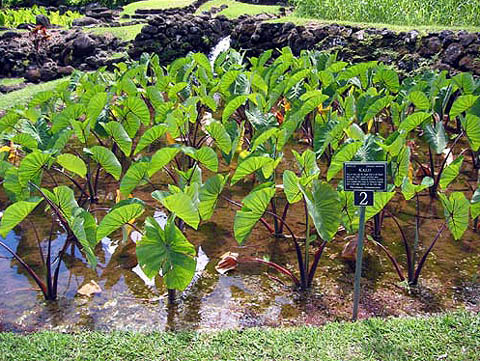Protesters angered over taro slight
by Nancy Cook Lauer on 31 March 2007 for Stephens Honolulu Bureau
Chanting "Clifton Tsuji, hear our bill," roughly 200 protesters stormed his Capitol office Friday, seeking a moratorium on genetically modified taro.
Almost 15 minutes of chanting eventually brought House of Representatives staff to the scene, promising a meeting with House Speaker Calvin Say if the rowdy group would come down from the fourth floor to the Capitol rotunda. The protesters got their meeting with Say, D-St. Louis Heights, Palolo Valley, and Rep. Tsuji, D-South Hilo, Puna, Keaau, chairman of the House Agriculture Committee.
They got their meeting, but they didn't get their way.
Say announced that the bill, SB 1826, was dead for the session. It might be brought back next year, he said, after the Legislature holds meetings with both sides and tries to forge a compromise.
"Because this is a very complex issue, we would like to consider bringing all the parties together," Say said.
That didn't sit well with protesters, many of whom are Hawaiian and see the taro plant as much more than just the source of poi. According to Native Hawaiians, taro, known as kalo, is a sacred ancestor, sprouting from the gnarled body of Haloa, the stillborn child of Wakea, the god of light.
"This isn't about taro, this is about our ancestry," shouted activist Walter Ritte, in a finger-pointing in-your-face standoff with Say and Tsuji. "This is an insult to Hawaiians."
"Leave our taro alone. We never asked them to do this for us," added Jerry Konanui, a Big Island taro farmer.
The incident exposed the raw emotion underlying the collision of technology and culture. Genetic engineering, promising a caffeine-free coffee plant, virus-resistant papaya and any number of other designer crops, is taking off in Hawaii's welcoming climate, fast becoming an economic engine to take the place of fading sugar and pineapple crops.
"This is a very complicated, complex issue, and it's a polarizing issue," Tsuji said. "There seems to be no middle ground."
The GMO taro bill is one of two GMO bills essentially dead for the legislative session as lawmakers in both houses show they have little taste for stopping genetically modified crops. The taro bill passed the Senate and died in the House. A bill putting a less stringent moratorium on genetically modified coffee passed the House and is dying in the Senate.
The Hawaii Crop Improvement Association, an industry group promoting GMO crops, said neither bill is needed because researchers have already agreed not to field test products until notifying and working with the nearby farmers to ensure no cross-pollination or contamination of non-GMO species.
"Rather than legislating coffee and taro R&D, we should find compromise through discussion among farmers and the Hawaiian community, government, academia and industry with the goal of allowing farmers the option to choose their preferred growing methods," said President-elect Adolph Helm.
Sen. Russell Kokubun, D-South Hilo, Puna, Ka'u, said he thinks it's time the Legislature took a more comprehensive look at the whole GMO issue, rather than hearing separate bills on each crop. Kokubun, chairman of the Senate Committee on Water, Agriculture and Hawaiian Affairs, said he's seen no evidence that GMO crops are harmful or hazardous in any way.
"If contamination is the issue, then we're talking about the whole industry," Kokubun said. "We're kind of skirting around it right now."
Critics of GMO crops say moratoriums will never get a fair hearing in the Legislature because of the influence of the seed industry.
Indeed, seed growers have proven to be a formidable lobbying group, and with good reason -- the biotech crop business is now second only to pineapple as an agricultural money-maker.
Seed producers now plant an estimated 8,000 acres on four islands -- about half of that in genetically modified seed crops, primarily corn. That contributes about $144 million of economic activity, $7 million in taxes and $53 million in wages annually for more than 2,000 workers, according to the Hawaii Crop Improvement Association.
The association wined and dined lawmakers earlier this month and flew two Midwestern farmers in to explain how important GMO crops are.
"Most of the corn planted around the world -- including biotech corn -- spent at least some portion of its development time in Hawaii," corn farmer Fred Yoder of Plain City, Ohio, told Pacific Business News. "We want elected officials to understand how important Hawaii is to our industry as a technology incubator."
Kokubun said he accepted the argument that a moratorium on taro was different because of its cultural significance. His committee passed the taro bill and it went on to pass the Senate with 16 in favor, 8 opposed and 8 voting yes with reservations. But Kokubun is pretty sure his committee and the Senate Energy and Environment Committee won't be hearing the coffee bill that passed the House with just four "no" votes.
That disappoints Captain Cook organic coffee farmer Una Greenaway, who has been working for five years, compromising a little more every year, to limit field testing of GMO coffee. She fears cross-pollination and contamination of the respected and pricey Kona coffee brand.
"We need to look at these on a crop-by-crop basis," Greenaway said. "Don't lump this in with the seed industry. This is a separate industry. This is an industry that needs protection."
|
